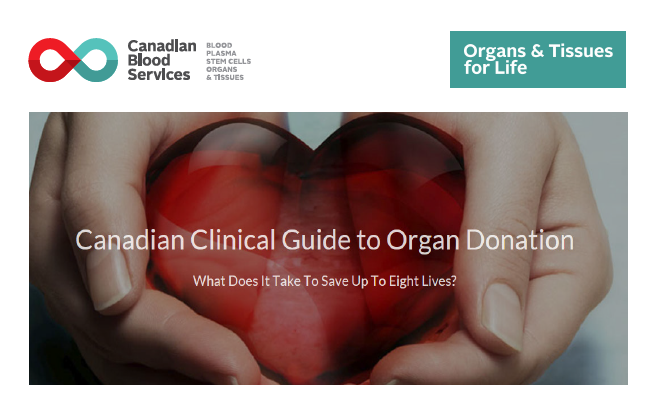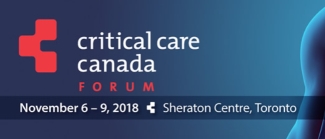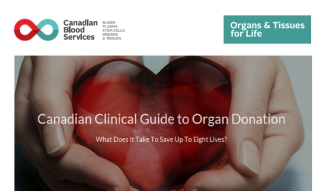Critical Care Canada Forum 2018

The Critical Care Canada Forum (CCCF) takes place this week in Toronto. The annual event is attended by hundreds of health professionals working in critical care, primarily physicians. A key event within the Forum is an unopposed plenary on brain death determination, to be held on Wednesday, November 7th.
I had the opportunity to chat with Dr. Sam Shemie, Canadian Blood Services’ medical advisor for deceased donation, about this important plenary session, as well as the World Brain Death Project, and the launch of a new professional education resource on neurological determination of death.

Why is brain death the focus of this CCCF plenary session and why is it an important subject for the critical care community right now?
A bit of context… Before the 1960s, and the introduction of technical advances like artificial breathing machines, diagnosis of death was clear. Back then, if the brain stopped functioning, the body would stop receiving the signal to breathe and eventually the heart would stop. The ability to replace breathing with a machine and prevent cardiac arrest was a great advance in the effort to save lives. For the brain injured patient, replacing breathing allowed doctors to try to understand the brain injury and to potentially reverse or improve the cause of that brain injury.
This advance also led to a certain type of patient that was never seen before: a patient with a brain injury who, despite all effort, had deteriorated to a state of complete and irreversible loss of all function of the brain.
What we now call brain death is death determined by brain-based criteria. These criteria are the loss of capacity for consciousness, the absence of brain stem reflexes, and the absence of the ability to breathe. (Severe brain injury to neurological determination of death: Canadian forum recommendations. CMAJ 2006 Mar 14)
The term “absence of capacity for consciousness” is a bit difficult for people to understand. What it means is that all functions of the brain have completely stopped and will never resume. Thinking, planning, moving, feeling, seeing, hearing, smelling — no ability to interact with environment, etc. There is no brain function. However, if one artificially replaces breathing, the organs of the body will continue to function.
Brain death is accepted medical practice in most countries of the world, including Canada, yet recent legal cases in the US and now in Canada where families have challenged the diagnosis of Brain Death on religious grounds. This ongoing legal challenge to the acceptance of Brain Death as death is concerning to the Critical Care community. Throughout the legal challenge process, the body of the individual who has been declared brain dead continues to be supported by machines. However, this is the complete cessation of all brain function and there is no returning from the state.
Of course, the topic of death determination is of concern to the Critical Care community. These professionals are the ones who are most likely to work with patients with devastating brain injury who can deteriorate to brain death. To better understand the issues surrounding medical and legal determination of death, the Critical Care Canada Forum (CCCF) is hosting an unopposed plenary session on Nov. 7th to allow for medical, legal and ethical discussion of brain death.
The plenary session is unopposed — which means no other sessions will take place at the same time so all delegates can attend. It will involve 90 minutes of expert presentations from the medical, legal, ethical and international perspectives, followed by a 30-minute Q&A period.
Plenary Session: Threats to the Concept of Brain Death
- B Kavanagh – Case Presentation
- A Joffe – Medical: Death is Not Brain-Based
- S Shemie – Medical: Death is Brain-Based
- H Scher – Legal Uncertainty
- D Jarvis – Legal Coherence
- R Sibbald – Ethical Reflections
- D Greer– International Perspectives on Threats to Brain Death
- Panel Discussion and Audience Questions
Read more in the CCCF program
What is the World Brain Death Project?
Brain death is accepted medical practice in most countries, though there may be variations in practice and understanding. The World Brain Death Project is an international collaboration of medical experts, professional societies and organizations that manage patients with devastating brain injuries leading to brain death. These professionals include world societies of Intensive Care (adult and pediatric), Neurocritical care, Neurology and Neurosurgery. This collaboration aims to develop an international minimum standard of practice to enhance the current medical and legal standing for the brain-based determination of death or as it is also called, death by neurological criteria. The goal is the harmonization of international practices to address the inconsistencies among practice in countries and between countries and identify gaps in knowledge that can be addressed by research.
The project is led by representatives from Canadian Blood Services including myself and Sylvia Torrance along with leading experts in neurocritical care including Gene Sung from UCLA, Ariane Lewis (New York University) and David Greer (Boston University).
You are also involved in the development of a new professional resource related to Neurological Determination of Death (NDD), can you tell me more about that?
Canadian Blood Services’ work in organ and tissue donation and transplantation includes supporting the development of leading practice and increasing opportunities for professional development and education. Historically, there has been no national curriculum to train specialists in organ donation. This project is changing that.
Ken Lotherington (Canadian Blood Services) and Jennifer Hancock (Dalhousie University) along with Pierre Cardinal and Aimee Sarti (The Ottawa Hospital Research Institute) are developing an online e-learning platform for various aspects of deceased organ donation. This ongoing, multi-year initiative will release two new national curriculum modules this year. The first module NDD/brain death is intended to be used as part of the required training for critical care residents and fellows. The teaching of NDD in Canada will be harmonized with existing leading practice and be available as a learning and teaching tool to train people -- enhancing the rigour of the determination of death to make sure there are no diagnostic errors is key.
Module 1: Canadian Clinical Guide to Organ Donation to launch
At CCCF 2018 members of our deceased donation team will be on hand to launch and demo the first module of the Canadian Clinical Guide to Organ Donation – an online e-learning curriculum that is Royal College accredited. Professionals will be able to register for the first module “Neurological Determination of Death”.

Module 1 learning objectives:
- Discuss normal CNS pathology and the pathophysiology leading to neurological death.
- Describe physician standards required for declaration of neurological death.
- Describe how to perform declaration of neurological death.
- Discuss confounding factors that preclude a clinical diagnosis of neurological death.
- Discuss the different acceptable ancillary tests for neurological determination of death.
- Explain some common confusing exam findings in a patient who has been pronounced neurologically dead (spinal reflexes, ventilator auto-triggering, etc).
If you’re attending CCCF 2018, visit Canadian Blood Services’ booth to learn more and to register for this new professional education resource.
For more professional education resources visit blood.ca/profedu
Canadian Blood Services – Driving world-class innovation
Through discovery, development and applied research, Canadian Blood Services drives world-class innovation in blood transfusion, cellular therapy and transplantation—bringing clarity and insight to an increasingly complex healthcare future. Our dedicated research team and extended network of partners engage in exploratory and applied research to create new knowledge, inform and enhance best practices, contribute to the development of new services and technologies, and build capacity through training and collaboration. Find out more about our research impact.
The opinions reflected in this post are those of the author and do not necessarily reflect the opinions of Canadian Blood Services nor do they reflect the views of Health Canada or any other funding agency.